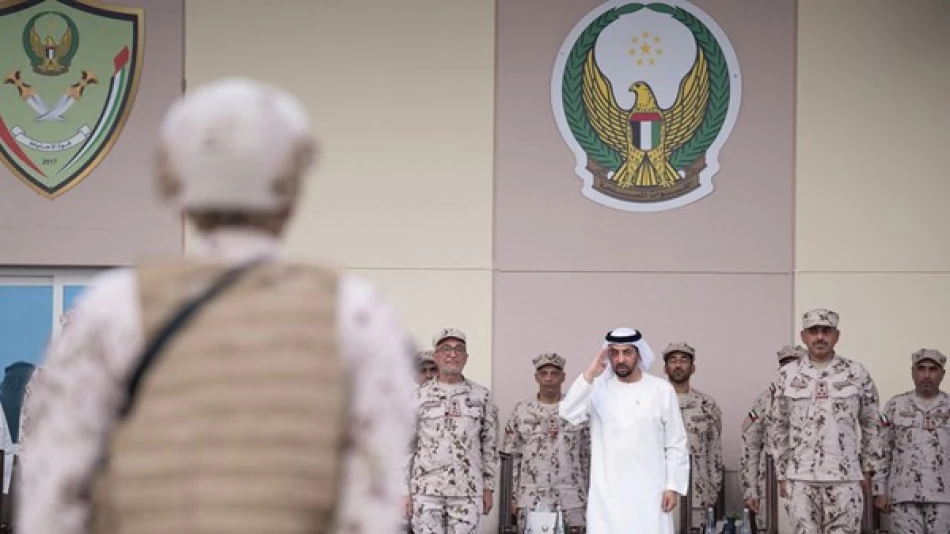
Emirati National Service Recruits Showcase Specialized Drills at Al Liwa Training Center
UAE's National Service Program Showcases Military Excellence as Regional Defense Priorities Intensify
Sheikh Hamdan bin Zayed Al Nahyan witnessed specialized demonstrations by the 22nd batch of UAE National Service recruits at the Liwa Training Center, highlighting the Emirates' continued investment in military readiness amid growing regional security challenges. The displays of combat tactics and disciplinary excellence underscore how the UAE is systematically building its defense capabilities through mandatory national service.
Elite Military Training on Display
The event, attended by senior military officials including Chief of Staff Lieutenant General Issa Saif bin Ablan Al Mazrouei, featured comprehensive field demonstrations that revealed the intensive preparation UAE youth receive during their national service period. Recruits showcased advanced combat techniques, tactical maneuvers, and coordinated infantry displays that reflected months of rigorous training.
The demonstrations included specialized exercises in military sciences, physical fitness, martial arts, and military discipline—components that transform civilian recruits into capable defenders within a compressed timeframe. This systematic approach mirrors successful conscription models seen in countries like Singapore and South Korea, where mandatory service builds both individual capability and national cohesion.
Strategic Investment in Human Capital
Sheikh Hamdan's praise for the recruits' readiness and discipline reflects a broader UAE strategy of investing in human capital as a cornerstone of national security. The National Service program, launched in 2014, represents more than military training—it's a nation-building exercise that instills values of loyalty, belonging, and civic duty among Emirati youth.
Regional Context and Timing
The emphasis on military preparedness comes as the Gulf region faces evolving security challenges, from drone threats to maritime security concerns in critical shipping lanes. The UAE's approach of combining mandatory service with advanced training methodologies positions it alongside other forward-thinking nations that view citizen-soldiers as essential to modern defense strategies.
Unlike purely professional armies, the UAE's model creates a broader base of trained personnel who can contribute to national resilience beyond traditional military roles. This approach has proven valuable in countries like Switzerland and Finland, where civilian populations with military training provide strategic depth.
Building Tomorrow's Defense Leaders
The intensive training regimen described—encompassing military sciences, physical conditioning, and tactical skills—suggests the UAE is preparing its youth for sophisticated defense challenges rather than basic military service. This comprehensive approach reflects the country's understanding that modern threats require citizens capable of operating advanced systems and adapting to rapidly evolving security environments.
The program's success, as evidenced by the professional displays witnessed by senior leadership, indicates that mandatory national service can effectively bridge the gap between civilian life and defense readiness when properly structured and resourced. For regional observers, the UAE's model offers insights into how smaller nations can build disproportionate defensive capabilities through smart human resource development.
Most Viewed News

 Layla Al Mansoori
Layla Al Mansoori






